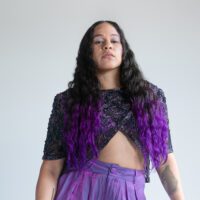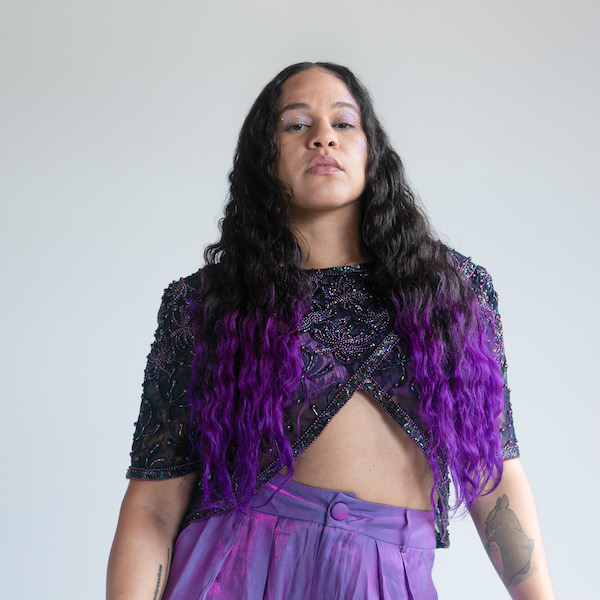Ikwe Forges Her Own Path to Healing with the MAKADEWIIYAASIKWE Project


“What does it mean to be a Black woman? What does it mean to be an indigenous woman? And what does it mean to be a Black and indigenous woman, like myself?” asks Kelsey Van Ert. She creates art under the moniker Ikwe, meaning “woman” in Ojibwe, the indigenous tribe rooted in her heritage, and these questions are central to her work as a storyteller, composer and performance artist.
A winner of the 2022-23 Agenda Artist Grant, Van Ert aims to complete a project she began in 2018 that ultimately got stalled by the pandemic. Entitled MAKADEWIIYAASIKWE (meaning “a Black woman, a woman of African descent,” in Ojibwe), the piece is a 90-minute sound poem backed by Ikwe’s original music. She began piecing it together at residencies at the Shed NY at Hudson Yards Open Call Artist in Residence Program and the Wyckoff House’s Protest Garden Residency, and hopes to finish mixing, mastering, releasing and celebrating the work with her Audiofemme grant.
The piece is a vehicle through which she grapples with her identity as a mixed race white, Ojibwe, and Black woman from St. Paul, Minnesota. It connects the history and healing process of the Native American and African American people, while shedding light on the Euro-centricity of Elisabeth Kubler Ross’ five stages of grief – you know the ones: denial, anger, bargaining, depression, and acceptance – through the melding of Black music genres with Ojibwe hand drum music, personal narratives, the sharing of shrouded U.S. history, and film.
Her mother is mixed white and Ojibwe and her father is Black, but she grew up mostly disconnected from her Black heritage in her father’s absence, though she notes her mother was sensitive about things like taking her to a proper Black hair salon. “I grew up reading a lot of Black literature and indigenous literature and seeing narratives about white and Black mixed people, or native and white mixed people, but not really seeing myself,” she explains. “Whenever I visited the rest of the reservation my family is affiliated with, there are mixed Black people, [but I wasn’t] really seeing us being represented.”
She finds herself at a particularly complicated intersection, given the historical prominence of social policing like the One Drop Rule and Blood Quantum measures. As you may or may not know, the One-Drop Rule emerged in the 20th century as a racial classification system, wherein if you had even “one drop” of Black blood, you were considered Black. As Van Ert puts it, “I don’t really say that I’m white, because that’s not how the world sees me… You can’t not be Black, and I think that defines a lot of how I relate to my culture, because I did not grow up with my father and his family.” It has colored a lot of her experience growing up in the Midwest, from her sometimes fraught relationship with her family’s reservation to a particularly egregious incident as a student at the University of Wisconsin, where someone called the police on her, even though she was walking around campus wearing a school sweatshirt.
While the One-Drop Rule was a means of control and classification, the Blood Quantum rule was developed as a tool for the erasure of indigenous communities. As she explains it, it’s “a measure of how much Native American blood that you have. And so it’s a measure of when you’re no longer Native American. And this idea has been adopted by most Native American tribes, and it’s a huge debate and a huge conversation right now, because blood quantum is doing exactly what it was built to do, which is to eliminate indigenous people.” It grows complicated in the sense that there are benefits on the line for indigenous people, like scholarship money, and as more and more people establish interracial families, these bloodlines grow more and more diluted.
“The thing that happens is because there’s a lot of mixing, so much time has passed, and the population that was 100% is now less than 1% of this country, you could be a quarter Native American, but you’re one eighth of this tribe and one eighth of another tribe, and then you can’t be part of any,” she explains. “Our blood quantum is actually off by a generation, because my great, great grandfather denounced his status as Native American to get a job at the post office.”
So when you embody multiple ethnicities, and are simultaneously labeled just one while actively erased from another, where does that leave you? For Ikwe, this is where the stages of grief come in, particularly as this commonly held system erases multi-cultural traditions of therapy and healing. Existing as a minority in a country as hostile to minorities as America is an actively traumatic process – people of color bear the weight of centuries of mistreatment and abuse, while also being constantly confronted with racially motivated violence and hatred on both the news and in their day-to-day lives.
“Right now, the main way to heal for everybody is this very Euro-centric way, through European-style therapy, knowledge, analysis, and cognitive behavioral therapy, that kind of stuff,” she says. “And then there [are] these stages that you go through. And then once you go through these stages, you will be alright. But what happens when you’re from a minority community that keeps having to restart the process over and over again, because you keep experiencing racism or trauma continuously? There isn’t, like, an indigenous map for dealing with grief.”
And so Ikwe has set out to map her own grief and healing through the MAKADEWIIYAASIKWE project, which she was inspired to begin, in part, by her great grandmother. “She was the last one to speak Ojibwe fluently, and when she had Alzheimer’s at the end of her life, she only spoke Ojibwe,” she explains. “But she didn’t teach my grandmother, or my mother, because she was afraid that they would, like, get taken and put into a boarding school. So my grandmother and my mother and I were doing a lot of learning. Part of my process was learning how to make hand drums, and learning songs. Healing songs, stories, every group is very different.”
But most importantly, she notes that when it comes to healing, “Everyone has a way.” And in an attempt to help others like her find their way, Ikwe is finding her own, too.
Follow Ikwe on Instagram for ongoing updates.

